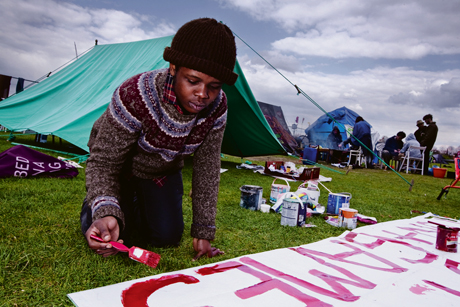An Olympic legacy for Hackney

A protester paints a banner on Leyton Marsh. Photograph:Tim Sullivan
It was another beautiful spring weekend in London, so I headed up the Lea River canal path, near my house in Clapton, for a walk on the Marshes.
Despite the happy atmosphere that only an unseasonably sunny day can bring, I couldn’t help but notice that smack bang in the middle of this open green space now sits a large fenced off construction site.
Most of this protected marshland usually enjoyed by dog walkers, horse riders and the local community, and home to several natural habitats, is now inaccessible as it’s dug up to build basketball courts by the Olympic Delivery Authority.
Many locals have been campaigning against construction taking place on the marshland, and four people from campaign group Save Leyton Marshes were arrested earlier this month as a High Court injunction was issued to remove protesters camped out at the site hoping to prevent work from going further. But the group have not given up, and protests are set continue.
Now, I admit that my natural cynicism roused a certain ‘Olympic disgruntlement’ in me for some time, but this particular impact so close to home has caused me to do a little digging of my own, into how or indeed if the Games are going to bring positive social and economic changes for residents of the host boroughs.
On initial sight the legacy claims appear to be unquestionably positive. I mean, who can argue with the Strategic Regeneration Framework vision that by 2015 host boroughs will see that:
120,000 more residents are in jobs;
99,000 fewer residents have no qualifications at all;
185,000 more residents have degree-level qualifications;
approximately 21,000 fewer children living in poverty;
1,800 more children achieve 5 A*-C GCSEs, including Maths and English;
more affordable family homes are available;
44,000 fewer people are affected by reported burglaries;
fewer people with a chronic health condition;
and 25,000 more adults will do weekly physical activity.
But surely I’m not alone in finding these bold ambitions just that- bold and overly ambitious. With plans to turn the Olympic site into the largest new urban park in Europe in 150 years, with state-of-the-art sports buildings, thousands of new homes and numerous transport improvements, I’m still at a loss to see how it’s really going to help those who called this area home prior to the Olympic invasion, particularly the huge unemployed, under educated population of the boroughs.
As Dee Doocey, Chair of the Economic Development, Culture, Sport and Tourism Committee states in a report into the Olympic legacy: “So far, only a minority of the jobs have gone to local people, and the number of apprenticeships offered on the Olympic Park is dismal. It is still unclear whether local people will get their fair share of the new housing compared with affluent incomers.”
So yes, by 2015 statistically speaking there may be more people living in the borough in jobs, with qualifications, and more active, but is this going to be reflective of previous residents of the area that really do need help, or due to an influx of wealthier middle class newcomers, pushing out low earners, now unable to pay the inflated rents.
My own cynical foresight, and research into giant sporting event legacy historically, leads me to imagine a scene of redundant sports centres, an inflated rental market, the squeezing out of independent shops and cafes, being replaced by chain stores, and taking me back to my original grievance, the open green landscape of Hackney marshes so central to my own community, suffering as developers find it easier to move in after permission was already granted to concrete over the protected marshlands.
I’m not anti Olympics per se, but with a distinct lack of evidence of how Olympic hosting meets its return in investment, economically or socially – Montreal for example have suffered financially since their chance to carry the torch- I really struggle to get behind the £9.4 billion spurge of public money, and the upheaval to my home.
Personally, I can’t help but be left wondering, when our country’s two most pressing issues are supposedly the economy and the environment, how do we justify £9.3bn of public sector money (three times the original bid, and likely to grow by at least another billion in legacy costs) being spent on the construction of a gigantic sports park, that will only require further spending and carbon waste to turn it into something useable and genuinely beneficial ?
